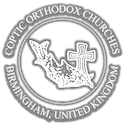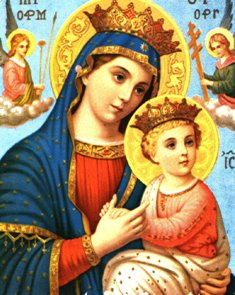 St. Mary the Theotokos (Mother of God) |
Our Lady, the all pure, Virgin St. Mary, the Mother of God, departed on the twenty-first day of the blessed month of Tubah. As she was always praying in the holy sepulchre, the Holy Spirit informed her that she was about to depart from this temporal world. When the time of her departure arrived, the virgins of the Mount of Olives came to her, with the apostles, who were still alive, and they surrounded her bed. The Lord Jesus Christ, to Whom is the glory, with a host of thousands and thousands of angels came to her and comforted her and told her about the eternal joy that was prepared for her, and she rejoiced. The apostles and the virgins asked her to bless them. She stretched her hand and blessed them all, and she gave up her pure spirit in the hand of her Son and God, and He took her spirit to the heavenly mansions. The apostles prepared the body in a fitting manner and carried it to Gethsemane. Some of the Jews blocked their way to prevent them from burying the body. One of the Jews seized the coffin with his hands, which were separated instantly from his body and they remained attached to the coffin. He regretted his evil deed and wept bitterly. Through the supplications of the saintly apostles, his hands were reattached to his body, and he believed in the Lord Christ. When they placed the body in the tomb, the Lord hid it from them.St. Thomas the Apostle was not present at the time of St. Mary’s departure. He wanted to go to Jerusalem and a cloud carried him there. On his way, he saw the pure body of St. Mary carried by the angels and ascended to heaven with it. One of the angels told him, “Make haste and kiss the pure body of St. Mary,” and he did. When St. Thomas arrived where the disciples were, they told him about St. Mary’s departure and he said to them, “You know how I conducted myself at the resurrection of the Lord Christ, and I will not believe unless I see her body.” They went with him to the tomb, and uncovered the place of the body but they did not find it, and everyone was perplexed and surprised. St. Thomas told them how he saw the holy body and the angels that were ascending with it. They heard the Holy Spirit saying to them, “The Lord did not will to leave her body on earth.” The Lord had promised his pure apostles to let them see her in the flesh once again. They were waiting for this promise to be fulfilled, until the 16th day of the month of Misra, when the promise was fulfilled and they saw her. The years of her life on earth were 60 years. She was 12 years old when she left the temple. She spent 34 years in Joseph’s house, until the Ascension of the Lord, and 14 years with St. John the Evangelist, according to the commandment of the Lord which he told her at the cross, “Behold, this is your son,” and to St. John, “Behold, this is your mother.”
|
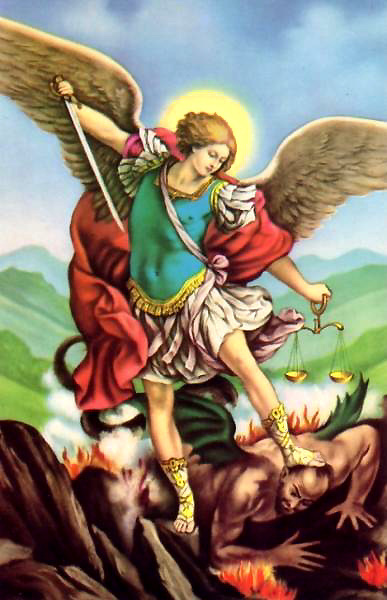 Archangel Michael |
The place of Archangel Michael in the Coptic Orthodox Church of Alexandria is a saintly intercessor, where he is seen as the one who presents to God the prayers of the just, who accompanies the souls of the dead to heaven, who defeats the devil. He is celebrated liturgically on the 12th of each month.In Alexandria, a church was dedicated to him in the early fourth century on the 12th of the month of Ba’unah. On the 12th of the month of Hathor is the celebration of Archangel Michael’s appointment in heaven, where Archangel Michael became the chief of the angels. |
 St. Mark the Evangelist |
On the 30th day of the blessed month of Baramoudah, which coincided with the 26th of April 68 A.D., the great apostle St. Mark, the evangelist of the land of Egypt, was martyred. He was the first Pope of Alexandria and one of the Seventy Apostles. His name was John, as the Holy Bible says: ‘He came to the house of Mary, the mother of John whose surname was Mark, where many were gathered together praying’ (Acts 12:12). He was the one that the Lord Christ, to Whom is the glory, meant when He said: ‘Go into the city to a certain man, and say to him, The Teacher says, My time is at hand; I will keep the Passover at your house with My disciples’ (Matthew 26:18). His house was the first Christian church, where they ate the Passover, hid after the death of the Lord Christ, and in its upper room the Holy Spirit came upon them. This Saint was born in Cyrene (One of the Five Western cities, Pentapolis – in North Africa). His father’s name was Aristopolus and his mother’s name was Mary. They were Jewish in faith, rich and of great honor. They educated him with the Greek and Hebrew cultures. He was called Mark after they immigrated to Jerusalem, where St. Peter had become a disciple to the Lord Christ. St. Peter was married to the cousin of Aristopolus. Mark visited St. Peter’s house often, and from him he learned the Christian teachings.Once Aristopolus and his son Mark were walking near the Jordan River, close by the desert, they encountered a raving lion and a lioness. It was evident to Aristopolus that it would be his end and the end of his Son, Mark. His compassion for his son compelled him to order him to escape to save himself. Mark answered, ‘Christ, in whose hands our lives are committed, will not let them prey on us.’ Saying this, he prayed, ‘O, Christ, Son of God protect us from the evil of these two beasts and terminate their offspring from this wilderness.’ Immediately, God granted this prayer, and the two beasts fell dead. His father marveled and asked his son to tell him about the Lord Christ. He believed in the Lord Christ at the hands of his son who baptized him. After the ascension of the Lord Christ, he accompanied Paul and Barnabas to preach the Gospel in Antioch, Seleucia, Cyprus, Salamis, and Perga Pamphylia where he left them and returned to Jerusalem. After the Apostolic Council in Jerusalem, he went with Barnabas to Cyprus. After the departure of Barnabas, with the order of the Lord Christ, St. Mark went to Afrikia, Berka, and the Five Western cities. He preached the Gospel in these parts, and believed on his hands most of its people. From there, he went to Alexandria in the 1st of Bashans 61 A.D.When he entered the city, his shoe was torn because of the much walking in preaching and evangelism. He went to a cobbler in the city, called Anianus, to repair it. While he was repairing it the awl pierced his finger. Anianus shouted in Greek saying ‘EIS THEOS’ which means ‘O, ONE GOD’. When St. Mark heard these words his heart rejoiced exceedingly. He found it suitable to talk to him about the One God. The Apostle took some clay, spat on it and applied it to Anianus’ finger, saying in the Name of Jesus Christ the Son of God, and the wound healed immediately, as if nothing happened to it. Anianus was exceedingly amazed from this miracle that happened in the Name of Jesus Christ, and his heart opened to the word of God. The Apostle asked him about who was the only God that he cried for when he was injured. Anianus replied ‘I heard about him, but I do not know him.’ St. Mark started explaining to him from the beginning, the creation of heaven and earth, the transgression and fall of Adam, the flood, how God sent Moses, who brought the children of Israel out of Egypt, and gave them the Law, the captivity of the children of Israel to Babylon, and the prophecies that foretold the coming of Christ.Anianus invited him to go to his house and brought to him his children. The Saint preached and baptized them in the Name of the Father and the Son and the Holy Spirit. When the believers in the Name of Christ increased and the pagan people of the city heard that, they were raged with anger and thought of slaying St. Mark. The faithful advised him to get away for a short while for the sake of the safety of the church and its care. St. Mark ordained St. Anianus a Bishop for Alexandria, three priests and seven deacons. He went to the Five Western Cities, remained there for two years preaching, and ordained bishops, priests, and deacons. He returned to Alexandria where he found the believers had increased in number, and built a church for them in the place known as Bokalia (The place of cows), east of Alexandria on the seashore. It came to pass, when he was celebrating the feast of the Resurrection on the 29th day of Baramudah, year 68 A.D., the same day coincided with the great pagan Celebration for the feast of the god Syrabis, a multitude of them assembled and attacked the church at Bokalia and forced their way in. They seized St. Mark, bound him with a thick rope and dragged him in the roads and streets crying, ‘Drag the dragon to the place of Cows.’ They continued dragging him with severe cruelty. His flesh was torn and scattered everywhere, and the ground of the city was covered with his blood. They cast him that night into a dark prison.The angel of the Lord appeared to him and told him: ‘O Mark, the good servant, rejoice for your name has been written in the book of life, and you have been counted among the congregation of the saints.’ The angel disappeared, then the Lord Christ appeared to him, and gave him peace. His soul rejoiced and was glad. The next morning (30th of Baramudah), the pagans took St. Mark from the prison. They tied his neck with a thick rope and did the same as the day before, dragging him over the rocks and stones. Finally, St. Mark delivered up his pure soul in the hand of God, and received the crown of martyrdom, the apostolic crown, the crown of evangelism, and the crown of virginity. Nevertheless, St. Mark’s death did not satisfy the rage of the pagans and their hatred. They gathered much firewood and prepared an inferno to burn him. A severe storm blew and heavy rains fell. The pagans became frightened, and they fled away in fear. The believers came and took the holy body, carried it to the church they built at Bokalia, wrapped it up, prayed over him and place it in a coffin. They laid it in a secret place in this church.
|
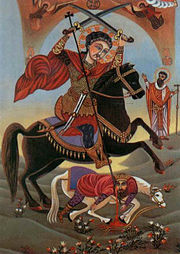 St. Philopateer Mercurius, also called St. Abu-Sefein |
St. Mercurius, known as the saint with the two swords (Abu-Saifain), was martyred on the twenty-fifth day of the blessed month of Hatour . He was born in the city of Rome. His parents were Christians and they called him Philopateer (which means “Lover of the Father”). They reared him in a Christian manner. When he grew, he enlisted in the army during the days of Emperor Decius, the pagan. The Lord gave Philopateer the strength and the courage, for which he earned the satisfaction of his superiors. They called him Mercurius and he grew very close to the Emperor. When the berbers rose up against Rome, Decius went out to fight them, but when he saw how many they were, he became terrified. St. Mercurius assured him saying, “Do not be afraid, because God will destroy our enemies and will bring us victory.” When he left the Emperor, an angel appeared to him in the shape of a human being, dressed in white apparel. The angel gave him a sword saying, “When you overcome your enemies, remember the Lord your God.” (That is why he is called, “of the two swords”, “Abu-Saifain”, one is the military sword and the other is the sword of the divine power).When Emperor Decius conquered his enemies and Mercurius came back victorious, the angel appeared to him and reminded him of what he told him previously, that is, to remember the Lord his God. Decius, and his soldiers with him, wanted to offer up incense to his idols and St. Mercurius tarried behind. When they informed the Emperor of what had happened, he called St. Mercurius and expressed his amazement at his abandoning of his loyalty to him. The Emperor reprimanded him for refusing to come and offer incense to the idols. The Saint cast his girdle and his military attire down before the Emperor and said to him, “I do not worship anyone except my Lord and my God Jesus Christ.” The Emperor became angry and ordered him to be beaten with whips and stalks. When the Emperor saw how the people of the city and the soldiers were attached to St.Mercurius, the Emperor feared that they might revolt. So instead, he bound him in iron fetters and sent him to Caesarea where they cut off his head. He thus completed his holy fight and received the crown of life in the kingdom of heaven.
|
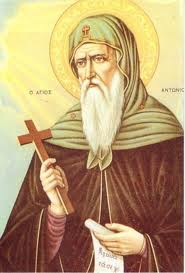 St. Antony (or Anthony) the Great, the light of monasticism |
On the twenty-second day of the blessed month of Tubah , of the year 355 A.D., St. Antony the Great, the star of the wilderness, and the father of all monks, departed. This righteous man was born in the year 251 A.D. in the city of Qimn El-Arouse, to rich parents who loved the church and the poor. They raised him up in fear of the Lord. When he was twenty years old, his parents departed, and he had to take care of his sister. Once, he entered the church and heard the words of the Lord Christ in the Gospel, “If you want to be perfect, go, sell what you have and give to the poor, and you will have treasures in heaven; and come, follow Me.” (Matthew 19:21) He returned to his house, decided to fulfill this commandment and considered it directed to him personally. He gave his wealth to the poor and needy, and he took his sister and placed her with some virgins. At that time, monasticism had not yet been established. All those who wanted to live a solitary life went and lived on the outskirts of the city. This was what St. Antony did as he dwelt alone, worshipping and living an ascetic life.? The devil fought him there by afflicting him with boredom, laziness, and the phantoms of women. He overcame the devil’s snares by the power of the Lord Christ. After that, he went to one of the tombs, and he resided therein and closed the door on himself. Some of his friends used to bring him food. When the devil perceived his ascetic life and his intense worship, he was envious of him, and he beat him mercilessly, then left him unconscious. When his friends came to visit him and found him in this condition, they carried him to the church. After he somewhat recovered, he went back to the same place. The devil again resumed his war against St. Antonius, only this time the phantoms were in the form of wild beasts, wolves, lions, snakes and scorpions. They appeared as if they were about to attack him or cut him into pieces. But the saint would laugh at them scornfully and say, “If any of you have any authority over me, only one would have been sufficient to fight me.” At his saying this, they disappeared as though in smoke, for God gave him the victory over the devils. He was always singing this psalm, “Let God arise, let His enemies be scattered; let those also who hate Him flee before Him.” (Psalm 68:1) St. Antony used to prepare a quantity of bread that would sustain him for six months. He did not allow anyone to enter his cell, and whoever came to him, stood outside and listened to his advice. He continued in this condition of solitary worship for 20 years. Then by God’s command, he went to El-Fayyoum and confirmed the brethren there in the faith, then returned to his monastery. During the time of persecution, he longed to become a martyr. He left his monastery and went to Alexandria. He visited those who were imprisoned for the sake of Christ and comforted them. When the Governor saw that he was confessing the Lord Christ publicly, not caring what might happen to him, he ordered him not to show up in the city. However, the saint did not heed his threats. He faced him and argued with him in order that he might arouse his anger so that he might be tortured and martyred. But God preserved him all along, according to His will, for the benefit of many, and so the Governor left him alone. Then the saint went back to his monastery according to God’s will, and many came to visit him and to hear his teachings. He saw that these visits kept him away from his worship. As a result, he went far away to the eastern desert. He travelled with some bedouins to the inner wilderness for three days, until he found a spring of water and some palm trees, and then he chose to settle there. On this spot now stands the monastery of St. Antony the Great. The bedouins came to him with bread, and the Lord drove away all the wild beasts from this place, for his sake.On occasions, he would go to the monastery on the outskirts of the desert by the Nile to visit the brethren, then return to his inner monastery. His fame spread abroad and it reached Emperor Constantine. The Emperor wrote to him, offering him praise and asked him to pray for him. The brethren were pleased with the Emperor’s letter, but St. Antony did not pay any attention to it, and he said to them, “The books of God, the King of Kings and the Lord of Lords, commands us everyday, but we do not heed what they tell us, and we turn our backs on them.” Under the persistence of the brethren who told him, “Emperor Constantine loves the church,” he accepted to write him a letter blessing him, and praying for the peace and safety of the empire and the church. One day, he was bored, and he heard a voice telling him, “Go out and see.” He went out and saw an angel who wore a girdle with a cross, one resembling the holy Eskiem, and on his head was a head cover (Kolansowa). He was sitting while braiding palm leaves, then he stood up to pray, and again he sat to weave. A voice came to him saying, “Antony, do this and you will rest.” Henceforth, he started to wear this tunic that he saw, and began to weave palm leaves, and never got bored again.St. Antony prophesied about the persecution that was about to happen to the church and the control of the heretics over it, the church victory and its return to its formal glory, and the end of the age. When St. Macarius visited St. Antony, St. Antony clothed him with the monk’s garb, and St. Antony foretold him what would be of him. When the day of the departure of St. Paul, the first hermit in the desert, drew near, St. Antony went to him. St. Antony buried St. Paul the hermit after he had clothed him in a tunic which was a present from St. Athanasius the Apostolic, 20th Pope of Alexandria. When St. Antony felt that the day of his departure had approached, he commanded his disciple to hide his body and to give his staff to St. Macarius, and to give one sheepskin cloak to St.Athanasius and the other sheepskin cloak to Anba Serapion, his disciple. He stretched himself on the ground and gave up his spirit. The angels and the saints took his spirit and carried it to the place of perpetual rest. This saint lived for 105 years, struggling in the way of holiness and purity. |

